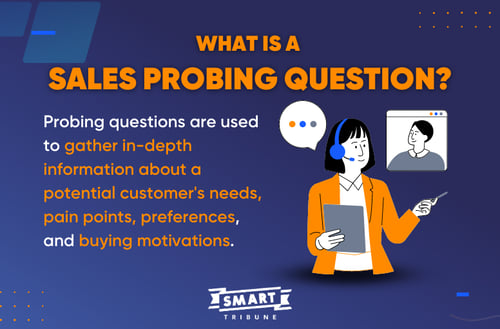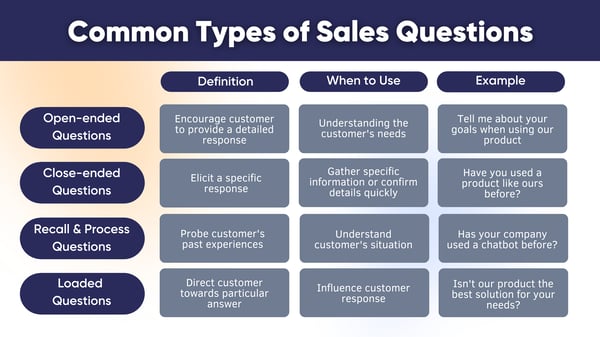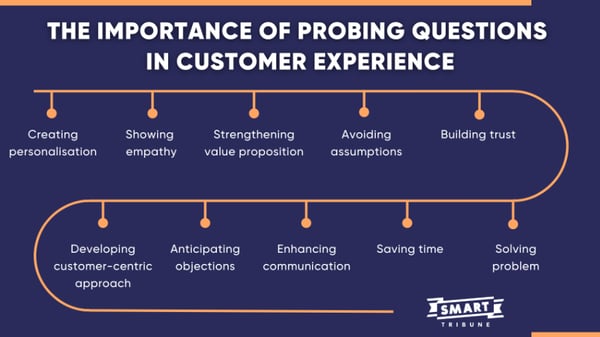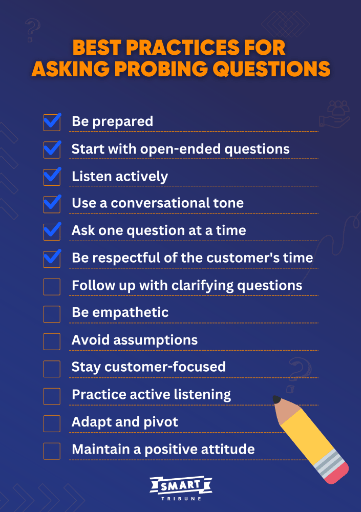
On AUGUST 1, 2023
Probing Questions in Sales: Definition, Types, Benefits and Best Practices
Along with the customer service chatbot, direct interaction with sales representatives plays an integral role in enhancing customer experience, closing more sales and driving revenue. In an effective conversation between sales staff and prospects, probing questions are powerful tools to get a better grip on potential customers.
Understanding the prevalence of good probing questions in customer service and customer satisfaction, in this article, Smart Tribune will be arming you with
- Definition of probing questions,
- List of good sales questions to ask,
- Types of engaging sales questions,
- Why probing for information boosting CX,
- Tips for asking probing questions,
- Frequently asked questions about probing questions.
If you feel pumped, let's get cracking.
What is A Probing Question?
Sales experts define probing questions as a type of question used to gather in-depth information about a potential customer's needs, pain points, preferences, and buying motivations. These questions are intended to go beyond surface-level information and elicit detailed responses that can help the salesperson better understand the customer's situation and tailor their sales pitch accordingly.

Best Probing Sales Questionnaires
General sales probing questions
A salesperson can harness the following top sales questions to grease the sales wheels. By asking general sales probing questions, you can get a broad picture of customers' hurdles.
1. How can I help you?2. Could you tell me more about your current problem?
3. What goals do you envision when you adopt this solution?
4. Can you give me an example of that situation?
5. Could you be more specific?
6. How long has it been a problem for you?
7. How long has it been an issue for your business?
8. Please give me some background on this problem.
9. Why do you think it is happening?
10. How does this sound to you?
Problem-centric probing sales questions
Problem-centric probing questions focus on the customer's pain points and challenges to emphasize the significance of your product or service.
1. How are you currently handling this problem?2. What impact has this problem had on your business?
3. What difficulties do you encounter when trying to achieve your goal?
4. What are the biggest challenges you currently encounter when performing this task?
5. How has the lack of [a chatbot] impacted your team's efficiency?"
6. What obstacles have you faced in achieving [2000 orders/month]?
7. Can you describe the difficulties you've experienced in managing [knowledge sharing activities]?"
8. What pain points do you encounter with your current [customer service]?"
9. How does your team handle [excess inquiries] when it arises?"
10. What inefficiencies have you noticed in your current [knowledge management strategy]?
11. Can you explain the bottlenecks that occur during [closing knowledge gaps at the workplace]?"
12. How do you currently address [knowledge management framework], and are you satisfied with the results?
While asking these sales questions, sales staff should list out metrics to evaluate customer service to opt for the best sales questions. Discover more about 6 customer service KPIs you absolutely must measure.
Benefit-oriented probing questions
These questions highlight the potential benefits and advantages of your product or service. They take center stage in encouraging the customer to visualize positive outcomes.
1. How do you think [Smart Dashboard] can streamline your current workflow?"2. What impact do you believe [Smart FAQ] will have on your team's productivity?
3. Can you envision how our [Smart Push] can save you time and resources?
4. How would our [Smart Bot] benefit your customers and enhance their experience?
5. What advantages do you see in using our [Smart Knowledge] over your current methods?
6. In what ways do you think our solution can help you reach your business goals faster?
7. How would access to real-time data with our analytics tool improve your decision-making process?
8. What do you see as the key benefits of integrating our [Smart Bot] into your existing systems?
9. Can you imagine how our [Smart Knowledge] will up-skill your employees and boost their performance?
10. How do you think our solution will positively impact your bottom line and overall profitability?
Budget and timeline probing questions
With the budget and timeline probing questions, you can determine the customer's financial capabilities and urgency to make a decision.
1. What budget range have you allocated for this project?2. How much do you currently spend on similar products/services?
3. Can you share your budget considerations for this specific initiative?
4. What is the maximum budget you can allocate to address [specific problem]?
5. Are there any budgetary restrictions we should be aware of as we discuss solutions?
6. When do you plan to implement a solution like ours?
7. What is the timeline for completing this project?
8. Is there a specific deadline you need to meet for resolving this issue?
9. Are there any upcoming events or milestones that influence your decision-making timeline?
10. How soon would you like to see results after implementing a new solution?
Competitor probing questions
Needless to say, understanding the competition allows you to address potential concerns and differentiate your product or service.
1. What other solutions are you currently considering to address [specific need]?
2. Have you had any experience with other products/services provider in the past?
3. How does our product/service compare to the solutions offered by [a specific brand]?
4. What factors do you find most important when choosing between different vendors?
5. In what ways do you think our product/service stands out from other product/service providers?
6. Can you share any feedback you've received from others who have used offerings from [a specific brand]?
7. What do you perceive as the strengths and weaknesses of [a specific brand]?
8. How would you rate the customer service and support provided by [a specific brand]?
9. What features or benefits do you believe set our product/service apart from other product/service providers?
10. Based on your experiences, how does our pricing compare to that of other vendors?
Common Types of Sales Questions
Probing questions in sales can be categorised into various groups, which highlight their grammatical attributes, and more important, their functions.
Four universal sorts of questions that sales representatives utilise on a daily basis are open-ended questions, close-ended questions, recall and process questions, and loaded questions. Let's take a closer look at each kind and its probing question examples.

Open-ended sales probing questions
An open-ended sales probing question is a type of question that encourages the customer to provide a detailed and thoughtful response rather than a simple yes or no answer.
These questions typically start with words like
- How
- What
- Why
- Tell me about
- Describe
Asking open-ended sales probing questions requires active listening and attentiveness. It allows the salesperson to gain a deeper understanding of the customer's needs. In turn, open-ended questions empower sales representatives to deliver targeted and relevant solutions, increasing the likelihood of a successful sale.
Open-ended probing questions examples
- What factors are most important to you when considering a new supplier?
- Tell me about your goals when using our product
Close-ended sales probing questions
A closed-ended sales probing question is a type of question that typically elicits a brief and specific response from the customer. These questions are designed to gather specific information or confirm certain details quickly. Unlike open-ended questions that encourage customers to provide detailed answers, closed-ended questions usually offer limited response options, often a simple "yes" or "no" or a short answer.
While closed-ended questions can be valuable for specific purposes, sales professionals should make full use of both open-ended and closed-ended questions during interactions with customers. This balanced approach allows for a deeper exploration of the customer's needs and facilitates a more engaging and productive sales conversation.
Examples of close-ended sales probing questions
- Have you used a product like ours before?
- Would you like to see a demo of our service?
Recall and process probing sales questions
Recall probing questions are designed to help the salesperson understand the customer's past experiences, decisions, or interactions related to products or services.
Meanwhile, process probing questions provide the salesperson with valuable information about the customer's decision-making criteria, timeline, and priorities.
Both recall and process probing questions contribute to a more comprehensive understanding of the customer's situation. This information and insights enable the salesperson to provide targeted and relevant solutions.
Examples of recall and process probing sales questions
- Has your company used a chatbot before?
- How did your team address this problem in the past?
- How does your team evaluate the effectiveness of a chatbot solution like ours?
Loaded probing sales questions
A loaded probing sales question is a type of question that contains a hidden or implicit assumption. These questions are asked to direct the customer towards a particular answer or influence their response in a specific way.
Many sales professionals believe that loaded questions are not 100% suitable for every case as they might sound biased. That's why loaded questions should be applied wisely and utilised less than open-ended questions to dig deeper into prospects' insights.
Examples of loaded questions in sales
- How did the previous chatbot solution fail to meet your expectation?
- Isn't our product the best solution for your needs?
Besides the aforementioned types, sales probing questions can be sorted by their functions:
- Clarifying questions,
- Problem-centric questions,
- Benefit-oriented questions,
- Budget and timeline questions,
- Competitor questions.
Whatever questions you ask during the buyer journey, the key to effective sales probing questions is active listening. By carefully considering the customer's responses, you can tweak the pitch to match the customer's specific needs and concerns.
The Importance of Probing Questions in Customer Experience
Probing sales questions have a crucial role to play in improving the customer experience during the sales process. When used effectively, these questions aid sales professionals to gain a deeper understanding of the customer's requirements, preferences, and concerns. This understanding, in turn, leads to several benefits that enhance the overall customer experience:

- Creating personalisation: Probing questions allow salespeople to gather specific information about the customer's unique needs. With this information, sales professionals can tailor their recommendations and solutions to match the customer's individual needs. That's why probing questions create a more personalized and relevant experience.
- Showing empathy: By actively listening to the customer's responses to probing questions, salespeople demonstrate empathy and understanding. Customers feel heard and valued, leading to a positive emotional connection with the sales representative and the company.
- Strengthening value proposition: Understanding the customer's conundrums and challenges enables the sales specialists to highlight how the product or service can address those issues effectively. This strengthens the value proposition and shows the customer that the offering is genuinely beneficial to them.
- Avoiding assumptions: Probing questions help sales professionals avoid making assumptions about the customer's needs. Instead of assuming what the customer wants, they gather accurate information directly from the customer. With customers' real needs in mind, sales staff can come up with more relevant recommendations.
- Building trust: When customers perceive that the salesperson is genuinely interested in their needs, they are more likely to trust their recommendations.
- Solving problems: Probing questions focus on understanding the customer's pain points and challenges. This approach positions the salesperson as a problem-solver who is eager to help the customer find the panacea.
- Anticipating objections: By delving into the customer's concerns and reservations through probing questions, salespeople can anticipate potential objections and address them proactively. This reduces friction in the sales process and streamlines decision-making.
- Enhancing communication: The back-and-forth nature of probing questions fosters open and effective communication. Customers are encouraged to share their thoughts and pain points, and salespeople can clarify any misunderstandings.
- Saving time: By understanding the customer's needs early in the conversation, sales professionals can focus on presenting the most relevant aspects of their offering. This saves time and ensures the customer receives the information they are most interested in.
- Developing customer-centric approach: Probing questions demonstrate that the salesperson is focused on the customer's best interests. This customer-centric approach is essential for building long-term relationships and earning customer advocacy.
Basically, by understanding the customer's needs and engaging in open communication, sales professionals can offer relevant solutions and create a positive and satisfying buying experience for the customer.
Sales experts confirm that you have to prepare different sales probing questions for different buying journey phases. Let's check out buyer journey map and drive revenue with proper questions.
Best Practices for Asking Probing Questions
The probing techniques can help sales professionals gather valuable information about their customers and tailor their pitch effectively. Here come some tips for asking sales probing questions.

- Be prepared: Before engaging with a customer, research their industry, company, and specific needs. This preparation will help you ask more informed and relevant probing questions.
- Start with open-ended questions: Begin the conversation with open-ended questions that encourage the customer to share their thoughts and elaborate on their needs. This sets the stage for a more in-depth discussion.
- Listen actively: Pay close attention to the customer's responses. Listen for important details, pain points, and preferences that can guide your follow-up questions and recommendations.
- Use a conversational tone: Frame your probing questions in a natural and conversational manner. Avoid sounding scripted, as this can put the customer on guard.
- Ask one question at a time: Keep your questions focused and concise. Avoid asking multiple questions at once, as this can overwhelm the customer and lead to unclear responses.
- Be respectful of the customer's time: While probing questions are essential, be mindful of the customer's time constraints. Balance the depth of questioning with the pace of the conversation.
- Follow up with clarifying questions: If the customer's response is not entirely clear, ask follow-up questions to gain a deeper understanding of their needs and concerns.
- Be empathetic: Show empathy and understanding when discussing the customer's challenges or pain points. Demonstrating that you genuinely care about their needs can build trust and rapport.
- Avoid assumptions: Do not make assumptions about the customer's needs or preferences. Base your questions on the information they provide, rather than preconceived notions.
- Stay customer-focused: Keep the conversation centered on the customer and their needs. Avoid discussing your product or service too early in the conversation; instead, focus on gathering information.
- Practice active listening: Show the customer that you are actively engaged in the conversation by nodding, using verbal affirmations, and summarizing their responses.
- Adapt and pivot: Based on the customer's responses, be flexible in your questioning strategy. Adjust your approach to explore areas that are most relevant and important to the customer.
- Maintain a positive attitude: Approach the conversation with enthusiasm and a positive attitude. Positivity can create a more enjoyable and productive experience for both you and the customer.
By following this customer-centric approach, sales representatives can lead to more successful sales outcomes and build stronger relationships with clients.
FAQs about Probing Questions
What are probing questions?
Probing questions in sales are questions used by sales professionals to understand the customer's needs, pain points, preferences, and motivations. These questions enable them to tailor their sales pitch effectively and offer appropriate solutions.
How to ask probing questions?
To ask sales probing questions effectively, use open-ended questions to encourage customers to elaborate on their needs and actively listen to their responses with genuine curiosity and empathy.
Bottom Line
Probing questions substantially contribute to the success rate of closing sales, therefore, sales representatives should consider practicing with these questions in particular scenarios to maximize their efficiency.
Hope that this article has supplied you with the basics of probing questions in sales. Should you have any questions regarding customer satisfaction or how to be better at sales, drop Smart Tribune a line for further assistance.

.png)



